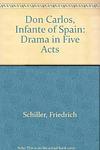Friedrich Schiller
Friedrich Schiller was a German playwright, poet, and philosopher. Born on November 10, 1759, in Marbach am Neckar, Württemberg, he became one of the most important figures in German literature. Schiller's works are known for their emotional passion and intellectual depth. He wrote a number of classic plays, including 'The Robbers,' 'Mary Stuart,' and 'William Tell.' Schiller also formed a close friendship with another giant of German literature, Johann Wolfgang von Goethe. His influence extends beyond literature into the realms of philosophy and aesthetics, and his writings played a key role in the development of German Romanticism. Schiller died on May 9, 1805, in Weimar, Germany.
Books
This list of books are ONLY the books that have been ranked on the lists that are aggregated on this site. This is not a comprehensive list of all books by this author.
-
1. Don Carlos: Infante of Spain, a Drama in Five Acts
"Don Carlos: Infante of Spain, a Drama in Five Acts" is a historical play that portrays the intense political and personal conflicts within the Spanish royal court. The story revolves around Don Carlos, the son of King Philip II of Spain, who is in love with his stepmother, Queen Elisabeth of Valois. The narrative also introduces Marquis Posa, a nobleman who advocates for freedom, and becomes a confidant to both Don Carlos and the King. The play explores themes of love, power, freedom, and betrayal, culminating in a tragic ending.
-
2. Mary Stuart
The play delves into the tragic life of the titular character, a former queen who finds herself imprisoned and facing execution at the hands of her cousin, the reigning monarch of England. It explores themes of power, betrayal, and the struggle for sovereignty, as the protagonist confronts her impending fate with dignity and courage. The narrative unfolds through a series of intense encounters with various historical figures, each revealing the complex web of political intrigue and personal vendettas that sealed her doom. The play ultimately serves as a poignant examination of the human cost of political rivalry and the inexorable march of history.
-
3. The Robbers
"The Robbers" is a dramatic tale of conflict between two aristocratic brothers, Karl and Franz Moor. Karl, the elder, is deeply idealistic but becomes an outlaw after being falsely led to believe he has lost his father's love and his inheritance due to his brother's machinations. Meanwhile, Franz, the younger brother, is a scheming villain who manipulates their father and seeks to consolidate power and wealth for himself. The play explores themes of justice, family loyalty, and the nature of good and evil as Karl leads a band of rebels against the societal corruption he despises, only to find that his quest for justice is fraught with moral ambiguity and personal tragedy.
-
4. Wallenstein
The book is a dramatic trilogy that delves into the complex life and times of a prominent figure during the Thirty Years' War, a European conflict that spanned from 1618 to 1648. It explores the rise and fall of the titular character, a powerful and ambitious general who commands the Imperial forces of the Holy Roman Emperor. The narrative examines themes of power, loyalty, and betrayal as the general navigates the treacherous political landscape, ultimately facing a tragic downfall due to his overreaching ambition and the machinations of his enemies. The work is a rich tapestry of historical drama and personal conflict, reflecting on the nature of authority and the consequences of hubris.
-
5. On The Naïve And Sentimental In Literature
This philosophical treatise explores the dual nature of artistic creation, distinguishing between two types of poets: the 'naïve,' who are characterized by natural simplicity and an unconscious alignment with the harmony of the natural world, and the 'sentimental,' who are reflective, self-aware, and driven by a sense of separation from that ideal state of nature. The author delves into the aesthetics and psychology behind these classifications, examining how each type interprets and represents reality through their work. The text serves as a profound inquiry into the complexities of human emotion, the creative process, and the ongoing dialogue between an artist's inner world and external reality.



